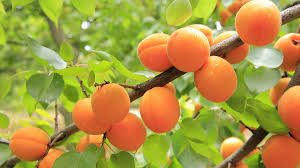Peaches are a stone fruit related to nectarines, cherries, and plums. Peaches have a soft fuzzy skin which is red on a yellow to a pale yellow almost golden background. Peaches are sweet, golden background. Peaches are sweet, a good source of Vitamin C and contain a good amount of other minerals especially potassium and are a great source of dietary fibre.

In Chinese culture, peaches are considered a symbol of immortality and friendship and are found in many Chinese artworks. Most cultivated peaches are divided into clingstone or freestone, depending on whether their flesh sticks to the stone or not; both varieties can have either white or yellow fresh.
The scientific name persica, along with the word “peach” is derived from an early European belief that peaches were native to Persia. The ancient Romans referred to peach as Malum persicum or Persian apple and the scientific or botanical name Prunus Persica literally means “Persian Plum”.

Peach cultivation went from China, through Persia, and reached Greece by 300 BC. Alexander the Great introduced the fruit into Europe after he conquered the Persians. The Peach was brought to the Americas by Spanish explorers in the 16th century and eventually made it to England and France in the 17th century, where it was a prized and expensive treat.
Peaches grow in a fairly limited range of dry, continental or temperate climates, since the trees have a chilling requirement that tropical areas cannot satisfy, except at high altitudes like in parts of India, Nepal, Ecuador, Colombia and also Ethiopia.
Health benefits
- Beta carotene is responsible for eye health and peaches contain a high amount of the antioxidant, along with vitamins A and C. Regular consumption of peaches can improve your vision health by increasing blood circulation through the body. The beta carotene also nourished and protects the retina in your eyes from free radical damage, as well as helping to prevent cataracts and age-related macular degeneration.
- Peaches being a great source of vitamin A and C, which are highly essential for skin health. Vitamin A provides moisture in the skin, which improves the skin texture making it soft and supple. Vitamin C is a powerful antioxidant that protects the skin from radical damage. Just one peach a day can keep your skin glowing and flawless. You can also rub peaches directly on your skin to help get rid of dark circles and wrinkles.
- Peaches are fat-free and contain an average of only 68 calories. The high amount of sugar in peaches is natural and therefore does not have an adverse effect on health. If you are on a weight-loss mission, having peaches handy will help you avoid more fattening and unhealthy processed snacks.
- Peaches are rich in anti-oxidants that help prevent cancerous cell growth. Peaches are known particularly for effectively protecting the body against lung, colon, and oral cancer.
- Eating peaches on a daily basis may help control high cholesterol and problems that lead to diabetes and heart diseases. This is mainly because peaches contain phenolic compounds that prevent the oxidation of low-density lipoprotein or LDL cholesterol. Also, foods rich in beta-carotene like peaches are good for lowering the cholesterol level in the bloodstream.
- One large peach contains a high amount of potassium and is very low in sodium, which helps in maintaining healthy blood pressure. If you have high blood pressure, then have a peach daily to combat the problem.
- Peaches have an excellent anti-inflammatory, antimicrobial and antioxidant properties.
You may like to read 3 Peach Recipes that you will relish
